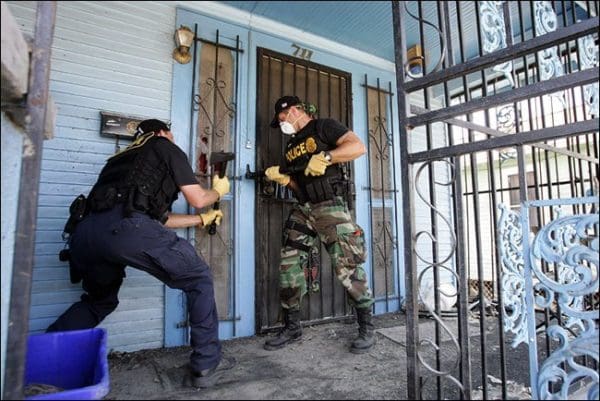“An Extreme Risk Protection Order (ERPO) empowers family members and police to take guns away from a person who may pose a danger to themselves or others,” abcnews.go.com reports. “The person’s access to firearms is blocked until they can demonstrate that the risk is over. Essentially, ERPOs are a temporary restraining order for guns.” What could possibly go wrong? Well . . .
Judges can issue an ERPO — the unconstitutional artist formerly known as a GRVO or Gun Violence Restraining Order — without any testimony from the accused. In other words, the accused is denied his or her Sixth Amendment protected rights. law.cornell.edu:
The Confrontation Clause found in the Sixth Amendment provides that “in all criminal prosecutions, the accused shall enjoy the right…to be confronted with the witnesses against him.” The Clause was intended to prevent the conviction of a defendant upon written evidence (such as depositions or ex parte affidavits) without that defendant having an opportunity to face his or her accusers and to put their honesty and truthfulness to test before the jury.
The ACLU will be along any moment . . .
Meanwhile, gun owners in states with an ERPO face the prospect of having their guns and gun rights removed at the behest of an estranged wife, pissed-off relative or vengeful police officer. What are the odds? Think about this . . .
What judge is going to say “no” to someone filing for an ERPO (especially if it’s a cop)? What judge wants to be “that guy”? The robed official who denied an ERPO in a case when the subject of the failed order went on to commit suicide, murder or mass murder? Better safe than sorry. Better your gun rights than his or her career.
Think about this some more . . .
Who are these people filing for an ERPO? Mental health experts? Nope. They’re family members and cops. If the antis crusade to “close the boyfriend loophole” succeeds, the list will grow to include present and former romantic partners. No one who could possibly act entirely out of hatred, anger and revenge [/sarc].
The answer to such concerns embedded in these laws is that courts must show “substantial evidence” that a person is a risk to themselves or to others. In addition, the removal of the firearm is only temporary (generally a year) unless the ERPO is renewed in a later hearing. These measures, said [Sandy Hook Promise’s Lauren] Alfred, have “overcome a lot the Second Amendment legal and political concerns.”
Yeah, no. Not feeling it. And where’s the “substantial evidence” that ERPOs are so effective at preventing the loss of life that they’re worth the loss of a Constitutionally protected civil right?
Where ERPOs are believed to be most often effective is in stemming suicides. For example, Everytown for Gun Safety cites a study of the law in Connecticut (where it has been in place the longest) that states that from 1999 to 2013, “For every 10 or 11 gun removal cases, one suicide was averted — an estimated 72 averted suicides.”
“Believed to be most effective.” Don’t you just hate it when mainstream media sticks a qualifier in front of “facts” and cite statistics from a study from a hugely biased group, without linking to the study?
Even if we take this “lives saved” assertion at face value — which reminds me of nothing so much as Obama’s “jobs saved” propaganda — does this mean that 90 percent (or more) of ERPO-served Connecticut residents did commit suicide?
While we’re at it, did The Constitution State’s ERPOs prevent concerned family members or police from taking more effective action to prevent suicide or murder?
Not only does an ERPO do nothing to help suicidal or homicidal citizens — who can find other means to kill themselves or others — it disarms citizens who may face a lethal threat from a dangerously disaffected spouse, former spouse or family member, or a corrupt or crazy cop. The kind of people who’d gladly file an ERPO to disarm their victim.
Not to mention the fact that the police are an extension of government, which has a known tendency to use whatever methods it can to disarm those who’d limit or would limit its power.
Citizens who pose a demonstrable lethal threat to themselves or others can be removed from the public using existing mental commitment procedures. It’s a process fraught with its own set of civil rights issues, but a much safer option for all concerned.
The People of the Gun should resist ERPOs at every level until such time as the courts strike them down for the civil rights abomination that they are.
